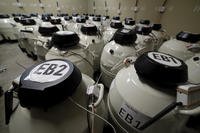
So, last month, I was doing what it seems like I do for about 80 percent of my working life--standing in an ice-cold exhibit hall at a defense conference, chatting with another defense reporter. We were in Washington, D.C. at the Office of Naval Researchs annual science and technology conference, which featured an entire day devoted to alternative energy.
Did you see the cold fusion booth? I asked.
The what? the other reporter asked.
The cold fusion booth, I replied. There are naval folks here presenting cold fusion.
No, no, thats not possible. This is a reputable conference, scoffed the other reporter.
I pointed to the booth and told him to go over and check it out for himself. He came back toting some books and shaking his head in amazement. Personally, I kept my distance, as Ive had my fill these past few months with the far reaches of science [For the record, I admire the Office of Naval Researchs open-minded approach to cold fusion scientists--and I remain sympathetic to researchers in the field, but itd be nice to see something other than promises and old reports.]
What was amazing for me, however, was not that there was a cold fusion booth at the naval conference, but that the cold fusion booth was about the only one there dedicated to energy issues. For all the talk of its commitment to alternative energy, the Pentagon doesnt appear to be taking steps to support spending on basic science and technology that could lead to breakthroughs. Forget basic science, even more advanced technology efforts, like hybrid vehicles, appear stalled, this month's National Defense magazine reports.
Theres some work around the edges---fuel cells and solar energy, as a recent issue of Defense Technology International noted. But there's no concerted effort. One could argue that the Defense Department isnt really the place to do energy research, but the Pentagon has deeper pockets than the National Science Foundation and better luck with innovation and high-risk endeavors than the stodgy Department of Energy. The Pentagon also has innate self interest, as the countrys single largest consumer of fuel. A well-funded, scientifically sound approach to energy research could have big payoffs for the military.
Or it would at least offer something better than a lonely couple booths at a trade show.
- Sharon Weinberger
Cold Comfort
© Copyright 2024 Military.com. All rights reserved. This article may not be republished, rebroadcast, rewritten or otherwise distributed without written permission. To reprint or license this article or any content from Military.com, please submit your request here.








